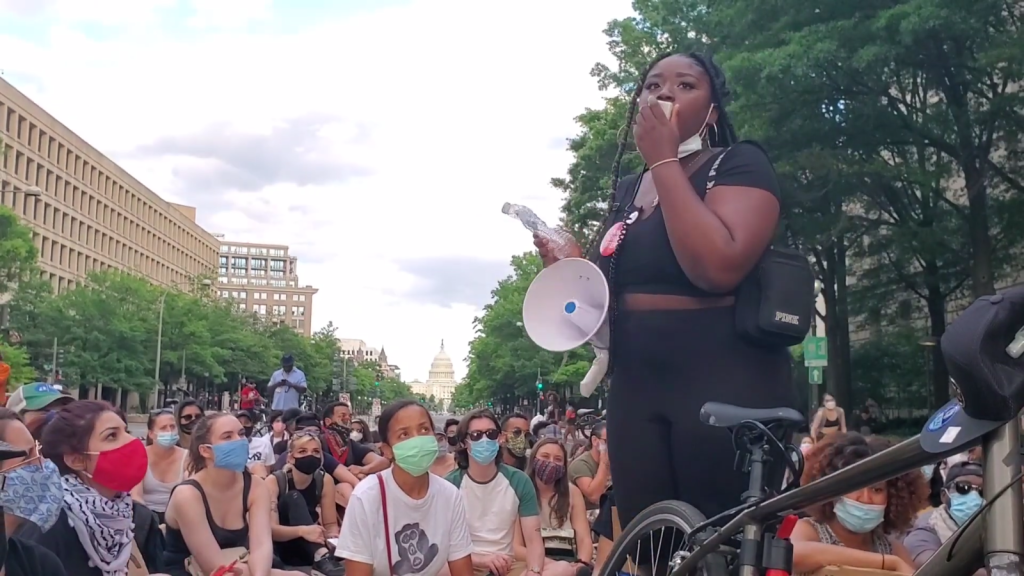
WASHINGTON D.C. – The Supreme Court ruled against President Trump’s bid to end the Deferred Action for Childhood Arrivals (DACA) program Thursday, preventing 700,000 recipients from facing possible deportation.
“We’re making history,” Anel Medina, a 28-year-old DACA recipient from Pennsylvania told The Immigrants Bay. She and other demonstrators came down to D.C. to celebrate the decision.
The Obama-era policy was established in 2012 to shield and provide work permits to undocumented immigrants, who entered the United States as children. It faced three years of possible termination when Attorney General Jeff Sessions declared DACA was illegal and unconstitutional in 2017, backed by Trump and the Department of Homeland Security (DHS). Three courts blocked the decision on grounds that the DHS did not file adequate paperwork. This was appealed to the Supreme Court.
Thursday’s 5-4 decision was led by conservative Chief Justice Roberts, who sided with the liberal wing of the court, Justices Ruth Bader Ginsburg, Elena Kagan, Stephen Breyer and Sonia Sotomayor. The Justices were not concerned with whether Trump could end DACA–rather, it stated the DHS did not provide sufficient reasoning under the Administrative Protection Act (APA).
“Here the agency failed to consider the conspicuous issues of whether to retain forbearance and what if anything to do about the hardship to DACA recipients,” Roberts wrote. DHS may again submit to end DACA while complying with the ruling.
The dissenting opinion, written by Justice Clarence Thomas and joined by fellow conservatives Justices Samuel Alito and Neil Gorsuch described the majority decision as “an effort to avoid a politically controversial but legally correct decision.” They determined DACA was unlawful, and questioned why the majority treated the case as an administrative mistake, when “on the contrary, this is anything but a standard administrative law case.”
“I think when DACA came out, we always knew it was a temporary two-year fix,” said Medina. She filed for DACA as soon as it was initiated, and has been a recipient for eight years. “So to…have a two year battle to have our arguments heard, for this day to come, it’s definitely been draining. But we stayed strong, and we won.”
“It’s a relief, 700 thousand dreamers tonight will be able to sleep peacefully, knowing that their lives are not in limbo,” said Yadira Sanchez, Co-Executive Director of Poder LatinX, an organization dedicated to increasing LatinX voices in the political process.
But Sanchez warns the fight isn’t over. DACA is a two year renewable deffered action–it is not a permanent status. It only delays deportation and gives the right to legally work, and does not have a path to citizenship. For recipients like Medina who have been in the United States since she was five-years-old, she would still not have a chance at citizenship.
“The end of the day, we want a pathway for citizenship, for all the dreamers, and for the 11 million undocumented immigrants that are in this country,” said Sanchez.
“This is an important win, but the fight is not over,” the American Civil Liberties Union (ACLU) tweeted Thursday. They filed an amicus brief in the Supreme Court case. “Now it’s up to the Senate to pass the Dream and Promise Act to permanently protect Dreamers.”
The Dream and Promise Act passed House in June 2019, and awaits to pass Senate. If passed, it would cancel removal proceedings for undocumented immigrants who come into the United States as children, and give a path to permanent residence status. DACA recipients may also apply for permanent residence under the act.
“The ball is in our court,” Sen. Chris Van Hollen (D-Md.) tweeted Thursday. “The Senate must pass the Dream and Promise Act.”
Additionally, the Supreme Court decision determined that the DHS must continue to accept DACA applications, but the DHS has yet to confirm that it will. United We Dream, the largest youth-led immigrant organization in the U.S., launched a petition Thursday demanding DHS to accept new DACA applications.
Sanchez and Poder LatinX believes a key to keep progressing DREAMer rights is through voting.
“We’re seeing the movement in the streets, and in the protest, we’re seeing the wins in the courts,” she said. “And now we need to bring that back to the ballot box, to see a big win this November 3rd.”
Written by Athiyah Azeem. Olga Petrovskikh and Lancelot Lin contributed to this report.

